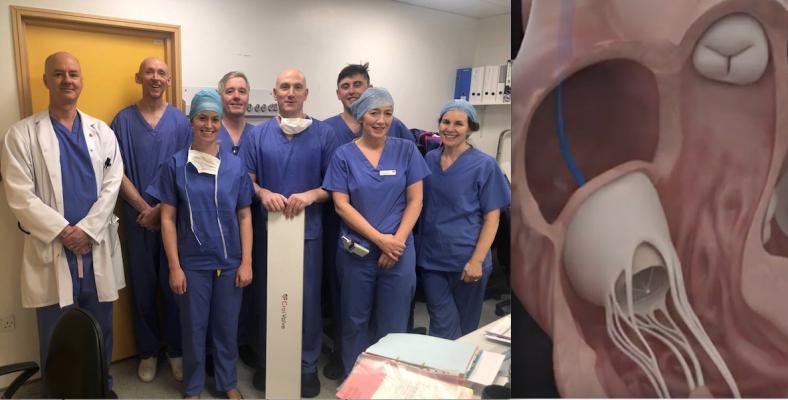
The heart team at St. James University Hospital Dublin was the first to perform a human implant of the CroiValve Duo Tricuspid Coaptation Valve technology for tricuspid repair.
March 25, 2020 — CroiValve announced the successful first human use of its Duo Tricuspid Coaptation Valve technology for tricuspid heart valve repair. The procedure was performed by an experienced Heart Team in St. James University Hospital Dublin, led by Stephen O’Connor, M.D., interventional cardiologist, and Michael Tolan, M.D., cardiac surgeon, assisted by doctors Andrew Maree, Charlie McCreery and Caroline Daly.
The patient had severe tricuspid regurgitation (TR) with reduced heart function and was at risk of a further deterioration in heart function with treatment of the tricuspid valve. Based on this, the patient had been turned down for open surgical repair. Because the unique, atraumatic approach of the Duo device allows for temporary implantation of the device to restore function without any impact to the native anatomy, the heart team elected to assess the acute effect of tricuspid valve repair on heart function. The procedure was approved by the Irish regulatory body (HPRA) under their compassionate use program.
“The unique capability of the Duo Coaptation Valve, to restore tricuspid valve function atraumatically, while facilitating straightforward percutaneous removal, enabled us to determine a strategy to treat the patient," Tolan said. "Considering this patient has had significant suffering from this disease and had no other options, we are extremely proud the physicians and staff at St James University Hospital found an innovative approach to understanding the right treatment approach for this patient.”
The procedure, delivery and retrieval were completed fully percutaneously, with the device delivered in five minutes without complications. TR was reduced from torrential to mild and the mean right atrial pressure reduced from 26 to 13 mmHg, with an increase in systolic BP, while the device was in situ. No significant change in right ventricular function was noted during the 30 minutes that the device was in place. The patient is recovering well from the intervention and permanent transcatheter repair of her valve is planned due to the positive cardiac response to treatment.
“Early use of the CroíValve system indicates it to be an easy to use, safe and effective intervention for patients with severe tricuspid regurgitation,” O’Connor said.
The Duo Tricuspid Coaptation Valve technology provides a simple and atraumatic approach for addressing severe TR in high risk patients. The device is currently being evaluated in a clinical study in Poland to assess the impact of correction of severe tricuspid regurgitation in patients, prior to surgical intervention. The system is also in development for permanent implantation, with clinical studies planned for early next year.
For more information: http://www.croivalve.com/


 November 14, 2025
November 14, 2025 









